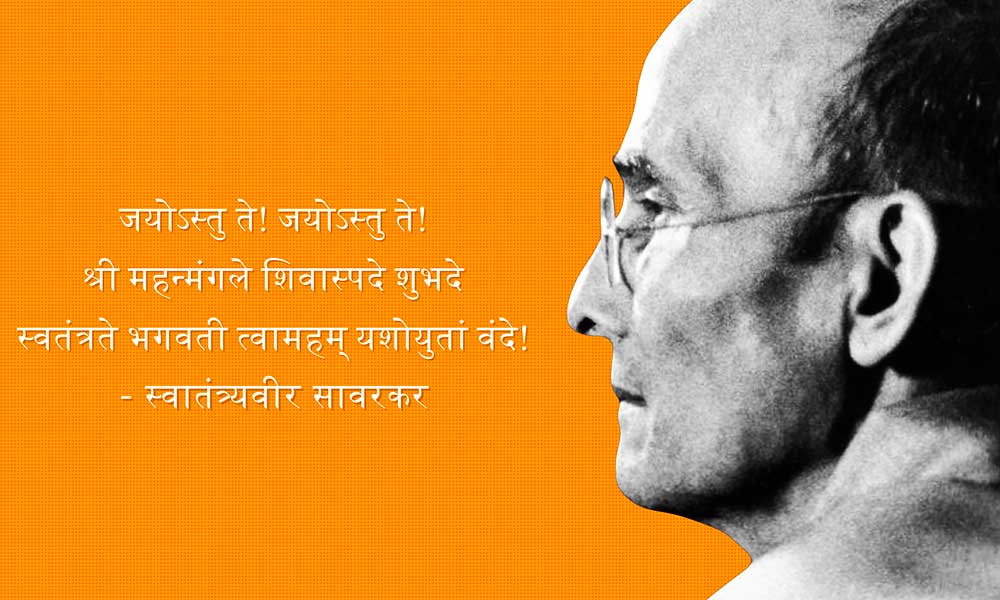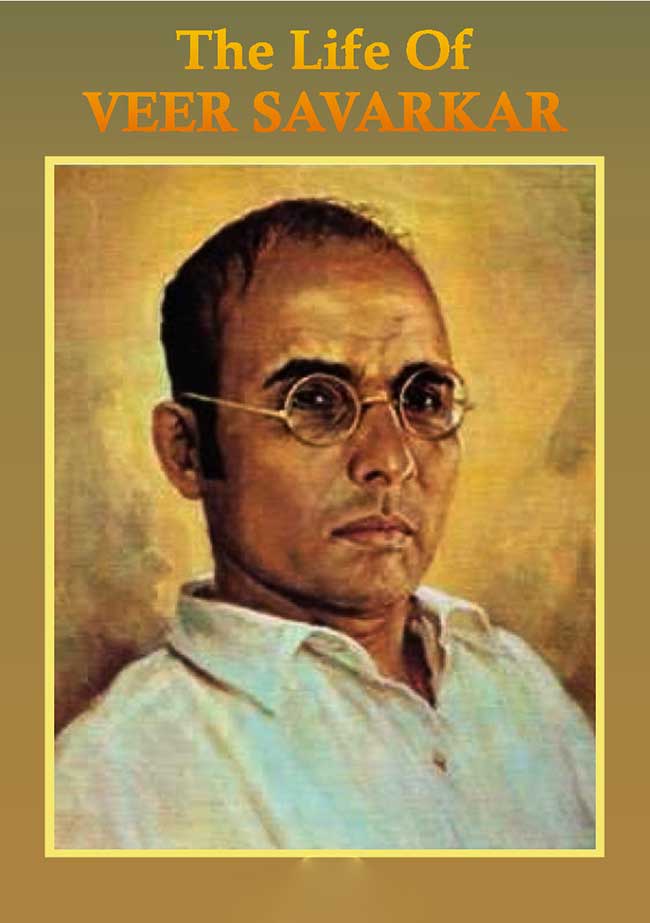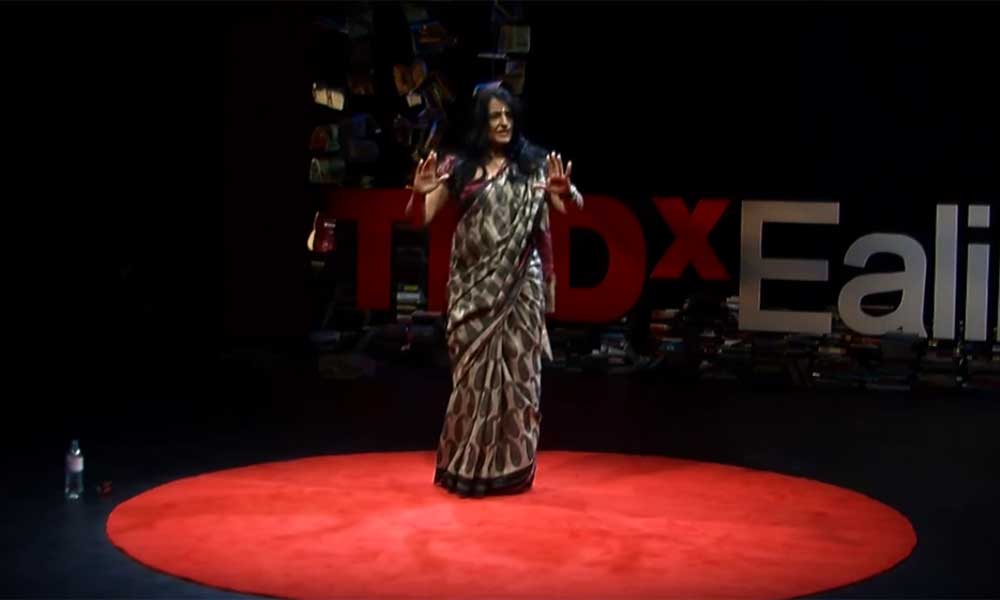In an era when religious conversions, community fights, terrorism and mass killings especially between Hindus and Muslims are on the upsurge, it is time we remember the contributions towards nationalism and Hindutva by a pro-independence activist, a politician, revolutionary, writer, poet and playwright, Vinayak Damodar Savarkar or Veer Savarkar, as he is popularly known. Basically, his philosophy on Hindutva is based on Indianness or the cultural identity of an Indian.
When people say “Shiva was the first Paigambar” or “all hindus are born muslims” and vice-a-versa then this is probably the correct time to define a Hindu and who can be a better person then Swatantra Veer Savarkar, the man who coined the term Hindutva for explaining the true meaning of being a Hindu.
On his 49th death anniversary today, Prime Minister Narendra Modi has paid tribute to him, tweeting that “he ignited the spark of nationalism in several lives.” Savarkar was the person who had coined the term ‘Hindutva’, as different from Hinduism that has more or less become related to social as well as political communalism. He was actively involved in reconverting converted Hindus back to Hindu religion and also made significant contributions towards eradicating and deconstructing caste system that had then gripped Indians like a strong wave ready to clamp them tight.
Hindutva – The Definition of a Hindu
Savarkar’s Hindutva was based more on creating a collective identity that is all inclusive of being pragmatic and rationalistic, humane, positive, realistic – philosophies of utilitarianism and universalism. Who is a Hindu in reality? Well, according to him, a Hindu is an Indian who considers India, from the peaks of Himalaya to the shores of Kanyakumari and from the ports of Gujarat to the tea estates of Assam, as his motherland, birth-land, work-land and spiritual-land (matrubhoomi, janmbhoomi, karmabhoomi and dharmabhoomi). In his words, “everyone who regards and claims this Bharatbhoomi from the Indus to the Seas as his Fatherland and Holyland is a Hindu.
Savarkar’s works on Hindu Nationalism
He was the first to start writing poems on the walls of jail and recite them, when he was imprisoned for fifty years in the Andaman and Nicobar Islands in 1910 because of his connections with the revolutionary group called, India House. His book, The Indian War of Independence on the Indian rebellion of 1857, the Mutiny war had been banned by the British officials. In 1921, at his release from jail, he was asked to follow the condition that he will not be attached with any revolutionary activities. However, he did advocate political and social unity as an orator and writer forcefully voicing out his opinions and philosophies across the country, particularly working as the President of the Akhil Bharati Hindu Mahasabha and making India a ‘Hindu Rashtra’, even going to the extent of opposing the ‘Quit India Movement’ in 1942, advocating for ‘Quit India Keep Your Army’ movement.
Difference between Savarkar’s Hindutva and Divisive religious ideologies
Even in jail Savarkar worked towards describing Hindutva and enthusiastically embraced the Hindu nationalism. His ideological treatise, Hindutva: Who is a Hindu? while in Ratnagiri jail is a testimony to his dedication towards bringing positive religious and spiritual changes in the country, much related to throwing light on the true scrupulous character of the human race. His vision of Hindutva defines social and political consciousness of a Hindu saying that he is a ‘patriotic inhabitant of Bharatvarsha’, much beyond a mere religious identity. He even went ahead to claim that Hinduism, Sikhism, Jainism and Buddhism are all one and even focussed on social and patriotic unity among all these Hindu communities. For him, the Hindu community or race is not restricted to Aryans or Dravidians but of “people who live as children of a common motherland, adoring a common holyland.”
He is even the founder of Ratnagiri Hindu Sabha, working towards the social and cultural preservation of Hindu heritage and civilization. He aggressively promoted the use of Hindi as a national language and even voiced out his opinion against untouchability.
How Savarkar is Being Perceived and His Philosophy on Hindu-Muslim Unity/Division
However, it is unfortunate that people have claimed his philosophies to be divisive and preaching Hindu nationalism as being uniquely Indian, stating that he preached “militant Hindu nationalist speeches.” This is so, even though the airport at Andaman and Nicobar Islands is dedicated to Savarkar as it has
been named Veer Savarkar International Airport. Many scholars, historians and even politicians (especially from the Indian National Congress) have even proclaimed that Savarkar has implicitly criticised and discriminated against minority communities such as those of Muslims and Christians. Savarkar argued that the unity and political loyalty of Muslims have been under the scanner for a long time. He rather was against the partition of countries for Hindus and Muslims: “the two nations shall dwell in one country and shall live under the mantle of one single constitution.” He proclaims one man one vote concept for Hindus and Muslims where “a Muslim has no advantage which a Hindu does not have. Minority is to be no justification for privilege and majority is to be no ground for penalty.”
People who have similar beliefs like Savarkar
In 2014, Goa’s Deputy Chief Minister, Francis D’Souza had to apologize for his statement where he proclaimed that “he is a Christian Hindu.” He, being a Christian had stated that India will become a Hindu nation and will remain so under the leadership of Narendra Modi. While referring to Hindu, he however claimed that by Hindu he did not mean religion but his culture, his values and nationalism and Christianity, being only 2000 years old is his religion only.
All said and done, the fact remains that both the Constitution and the Supreme Court have accepted Savarkar’s ideologies and principles on Hindutva as the true meaning and definition of a Hindu.
All those who consider India as there motherland are Hindu – Veer Savarkar! On your 49th death anniversary, we bow to you and salute you for your immense and unparalleled contribution to Indian Independence movement and towards changing people’s stringent mind-sets.






